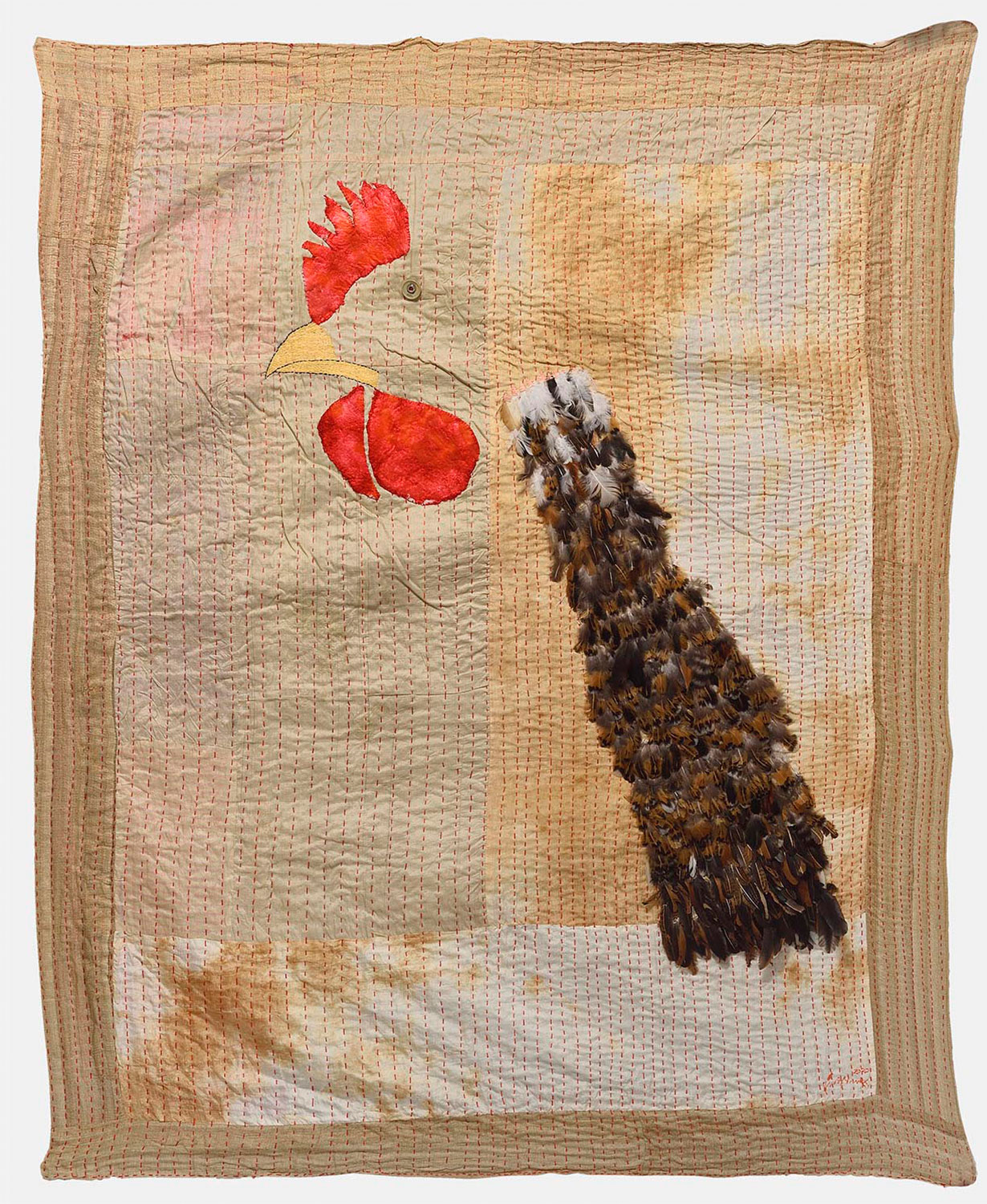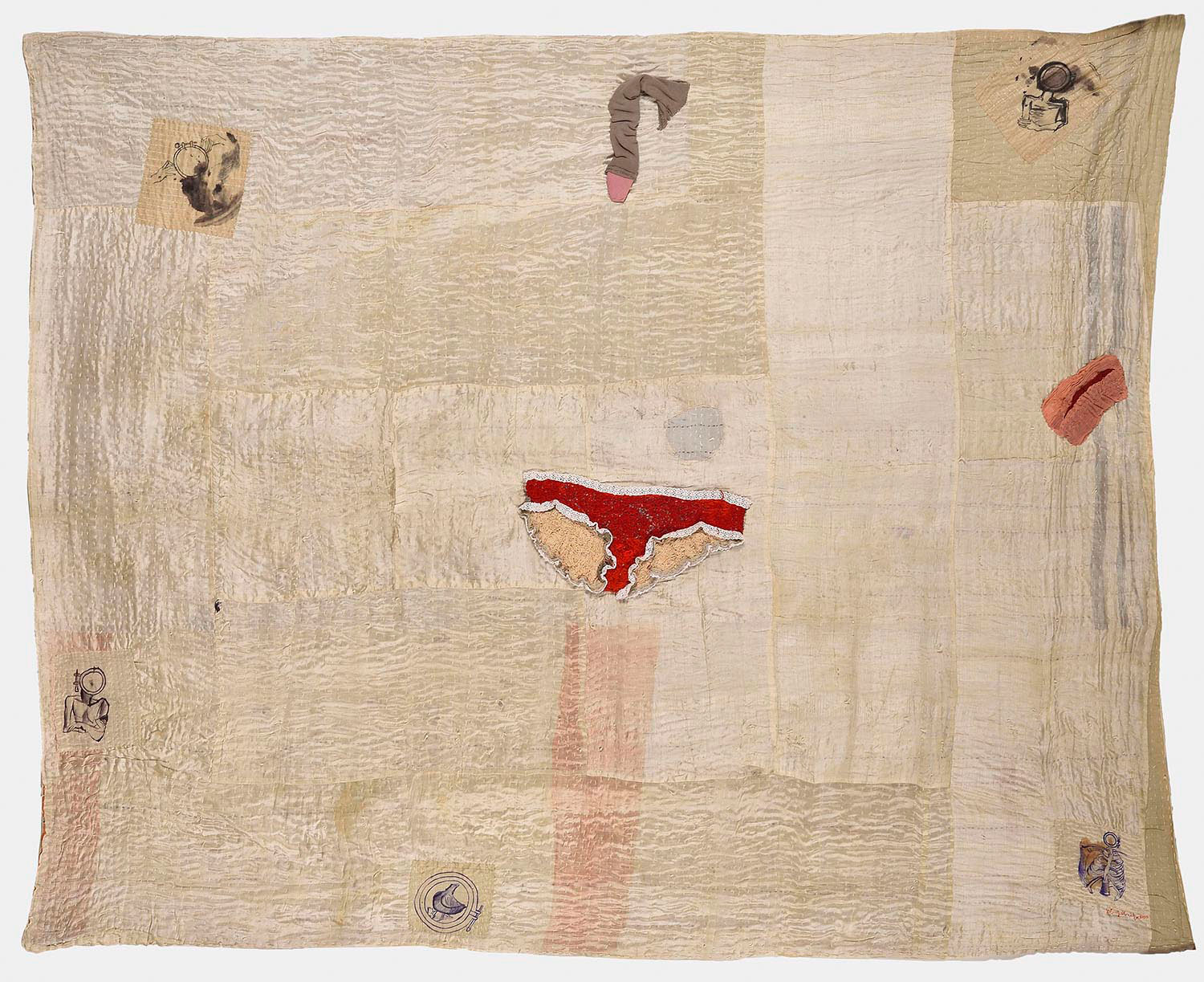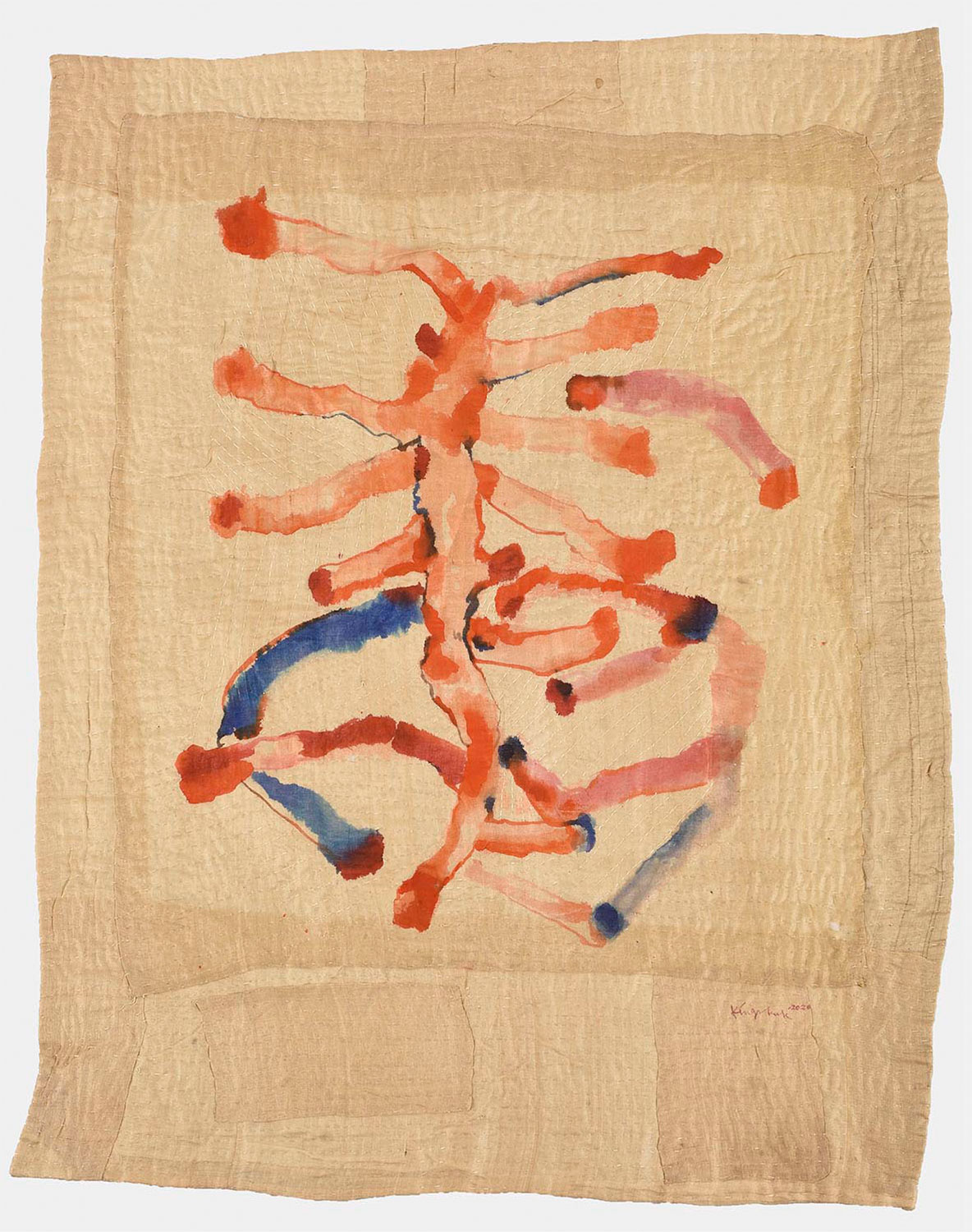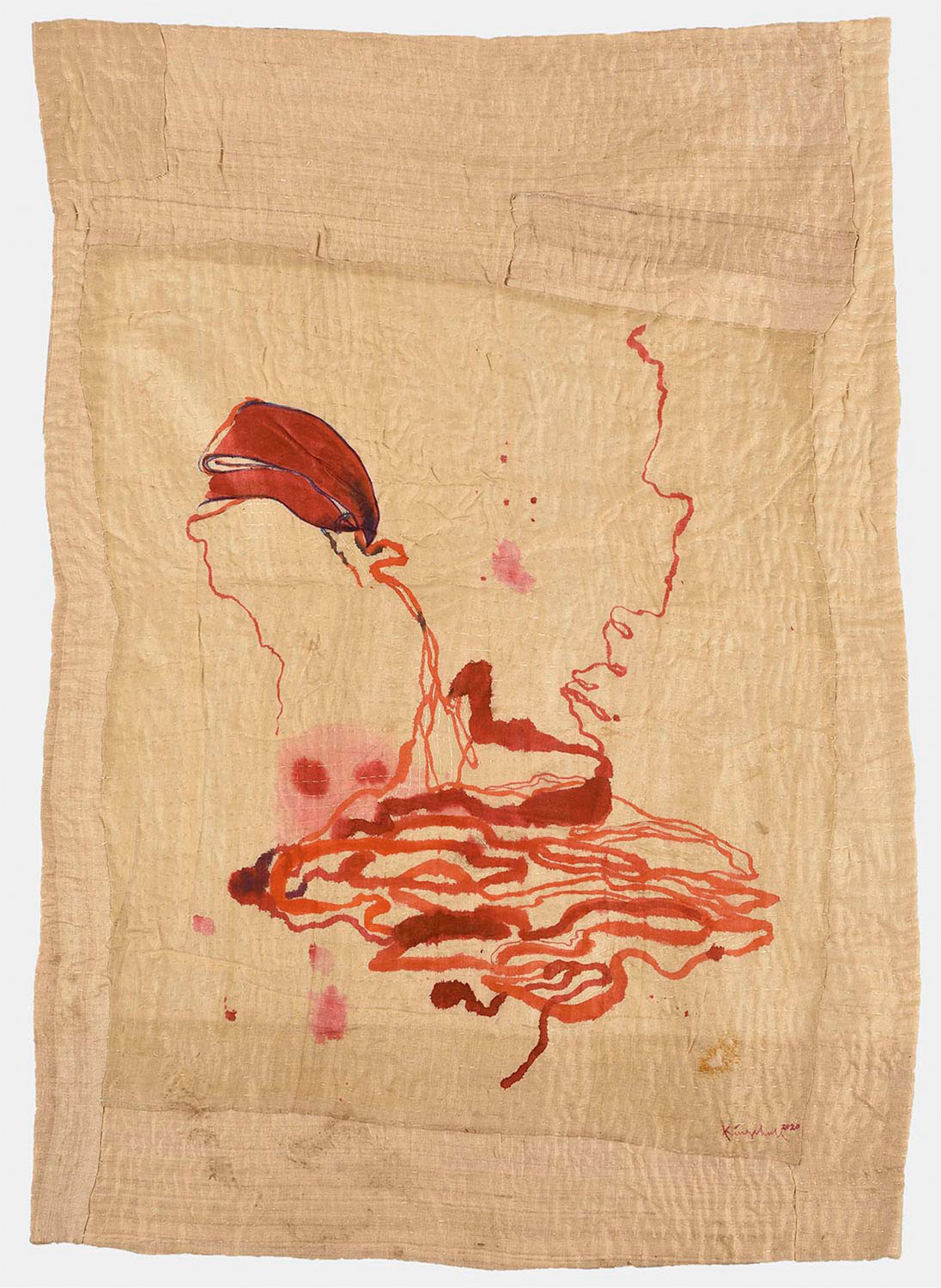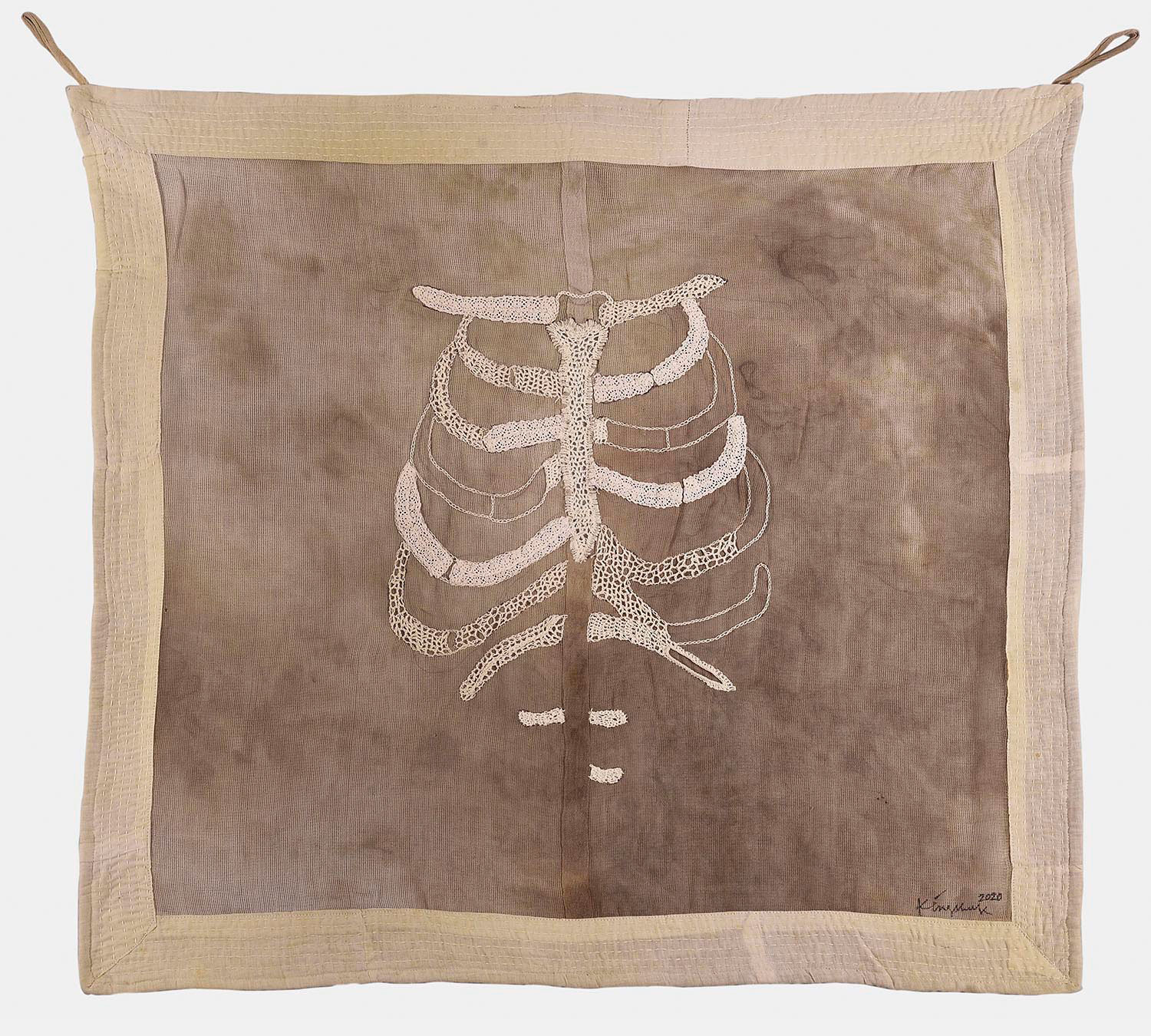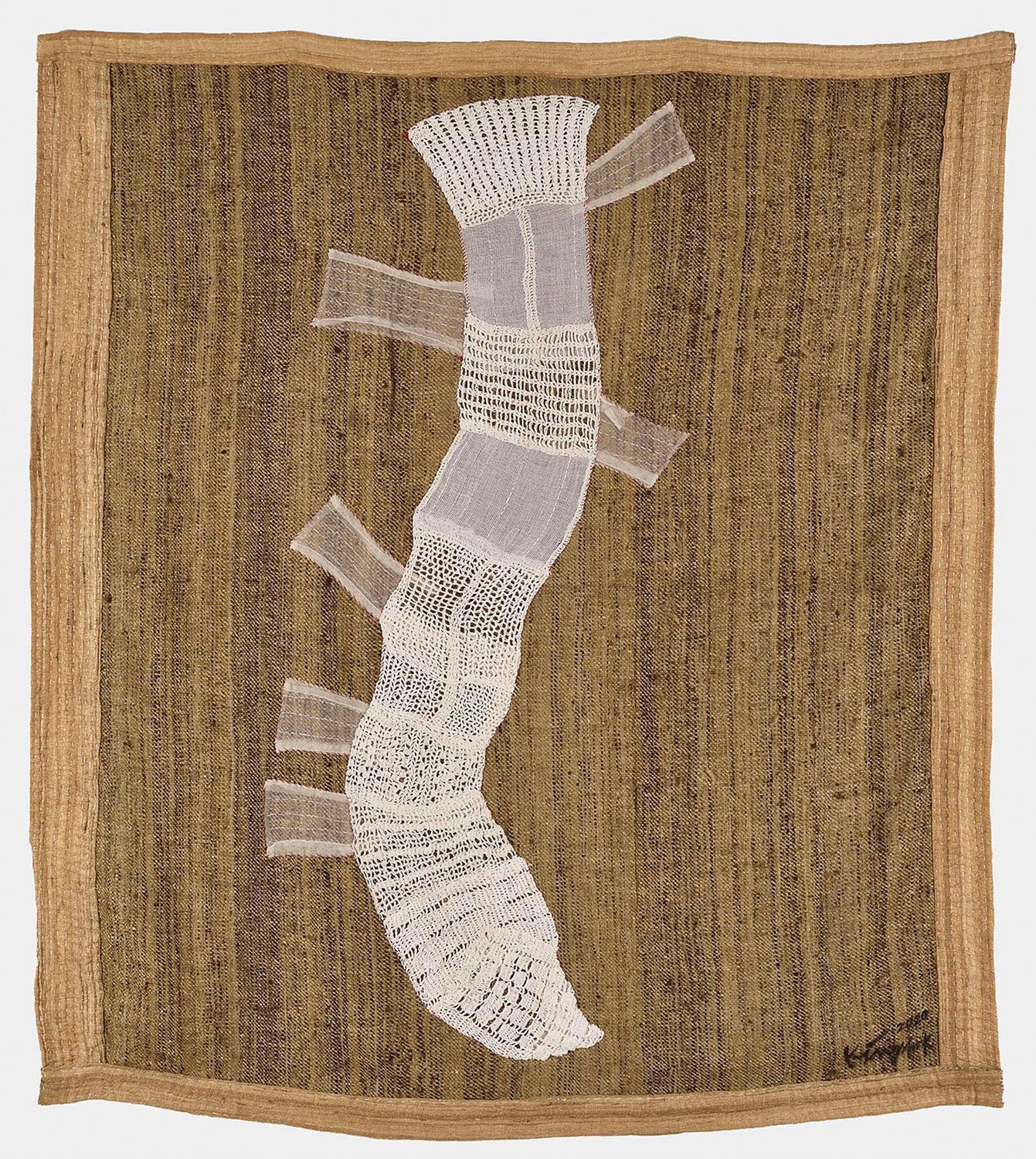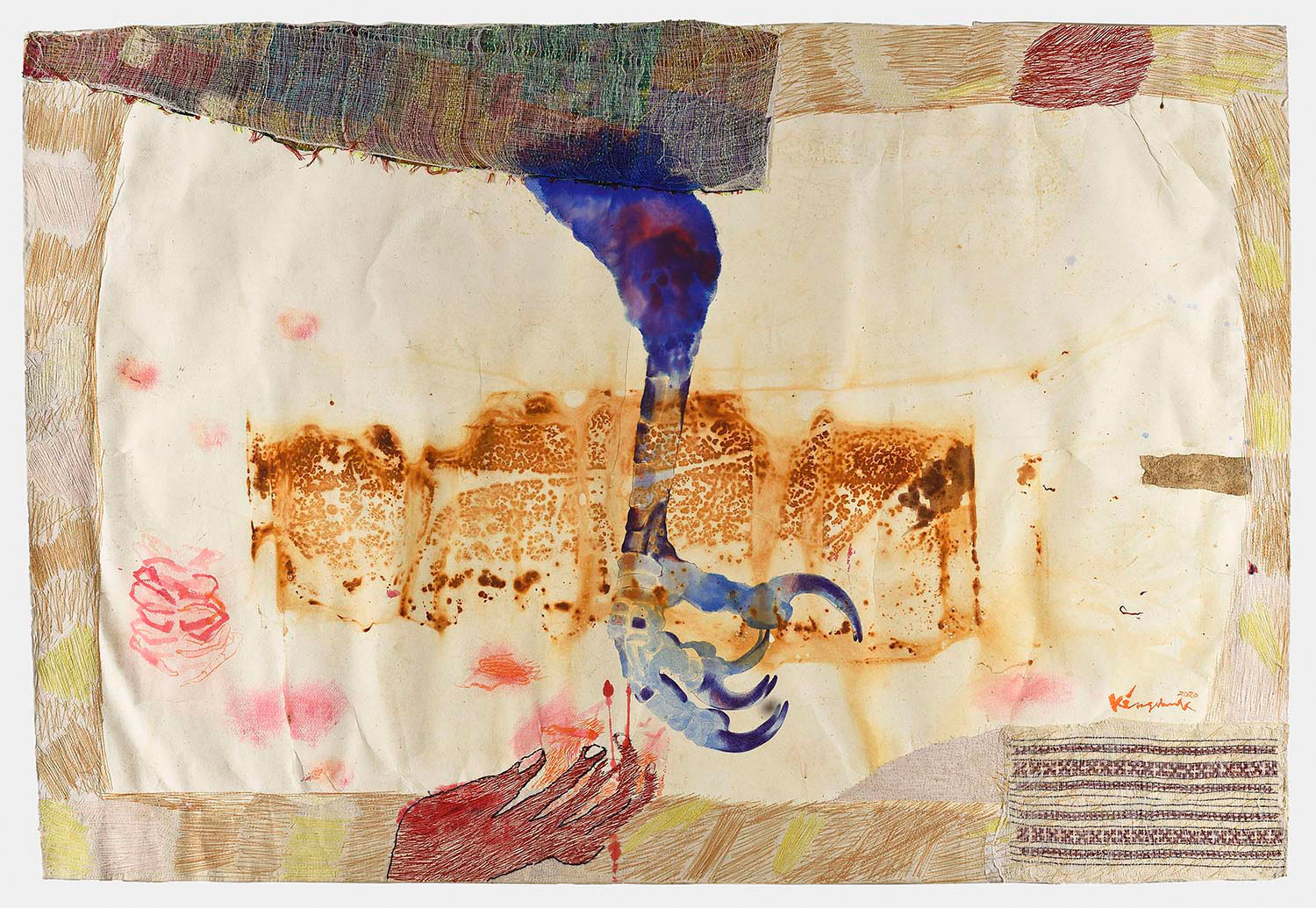
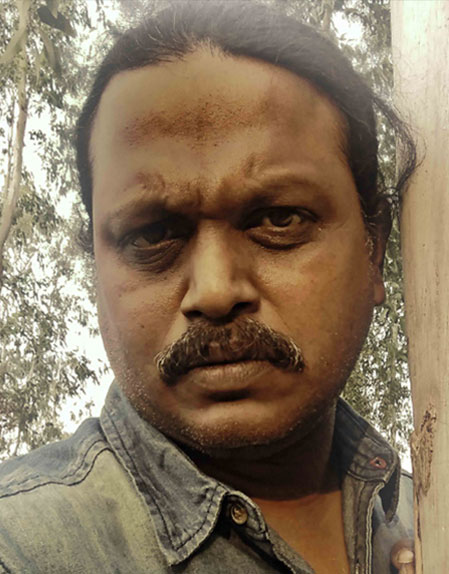
KINGSHUK SARKAR
Kingshuk Sarkar’s scavenging is a way of mining the diverse richness of Birbhum to redefine his creative pursuit in terms of a wider engagement with Nature, local farming, crafts and community traditions. He seems largely to have been shifting his focus from the image per se to material objects that aren’t anonymous in their newness but have evolved a personalized ambience through use. Whether it’s paper made from natural fibres and agricultural waste, or cotton and silk weaves: both carry in them the story of a thriving synergy between the earth and human activity, particularly of the groups that live directly off it, through pre-industrial, sometimes even primitive, techniques.
Discards from the wardrobe and around the home are reinvented as well, for they acquire connotations of living that transcend their finite thingness: in order to “depict not the thing” as Mallarme had said of Symbolist poetry, “but the effect it produces”. Especially by quizzing the fluid nature of found objects when they are re-contextualized into customised avatars. At the same time, the artist’s empathy with the deprived and the exploited lends a socio-cultural dimension to his art.
This time, he has concentrated on weaves, both cotton and silk. And on damaged cocoons. The delicate mesh of silk from them can be snow white or cream depending on the geographic address. This is an intriguing stage between the raw and the refined; when it can be called neither paper nor cloth; nor has it quite acquired the firmness of thread. And that’s how it retains its fascination for being a mysterious mutation in Nature that man can never quite analyze.
A distinctive country flavour emerges when chicken and duck feathers are added to a 6 ft x 3.6 ft cotton wrap, alluding to tribal cultures that reuse bird plumage. Sketched motifs link the object — the cloth, in this case — with the human environment in which it was made. Like a haggard, emaciated head that brings to mind toilers of the soil. Another work makes use of a 7 ft X 5 ft silk quilt, layered and stitched in the tradition of nakshikanthha. It is studded with sketches and little objects. A pair of them winks with a naughty, Dada insouciance for one object resembles a dainty panty and another mimics the male member.
Another Duchampesque prank nudges him to fish out an old pair of his own battered jeans. Out of one small pocket emerges, like a genie, a large, run-down canvas with stains and hectic graphite scribbles that simmer with the angry energy of underground graffiti. This cloth installation is rife with multiple innuendoes: the secret treasures of boyhood stuffed into pockets, the subversive put-down of purity, cleanliness and neatly packaged social — middle class — norms, the degage chic of youthful banter. In fact, there runs through this set a philosophic repudiation of the values promoted by industrial civilization and its market-driven culture.
As in Rashmi’s feminine vision, this is not a manifesto rebellion. Rather, it’s a kind of aesthetic fundamentalism by which a contemporary sensibility seeks to recover the somewhat utopian, bare-feet-on-the-grass spirit that Shantiniketan once embodied.
Rita Datta,
Art Critic,
Kolkata, June 2020
My work is not just what it looks like and feels like, it engages a process which has influenced how I live. My instincts, memories, philosophies and experience all contribute towards a holistic orientation, which integrates social and ecological concerns. The mediums and surfaces of my work are proactive players, they add to the form and content, to evoke a specific response. These four elements have a symbiotic relationship. For this symbiosis, my work involves physically, exploring materials and processes, because the content is about social unrest, violence and finding sustainable solutions from within the community and natural environment. Mediums and surfaces carry a purpose, history and cultural standpoint which are pluralistic in context to my social scape.
I combine found and recycled objects with traditional paint and ancient indigenous skills restructured to best fit with my temperament. I take time to let things settle down after initially working on it then leave it folded with a stack of other unfinished works. After things are aged with time, natural wrinkles and stains makes the surfaces look like an instinctual response towards the space we are within – nonstretched, uneven, sort of a creepy, crumpled and wrinkled landscape, a kind of saggy flesh as if hanging forlornly. Then I finish the work with a physical and gestural hubris often with a disparate mindset from the one with which I began the work with originally.
Kingshuk Sarkar
Santiniketan
02-08-2020
Click images for enlargement
Born: 1972
Education
2002-03: Studied Japanese Calligraphy and Sumi Painting, Saga University of Fine Arts, Kyoto
2001-03: Studied as a Research Scholar in Japanese Style Painting, Kyoto Univeresity, Kyoto
1999: M.F.A. with a first class, Kala Bhavan, Visva Bharati University, Santiniketan
1997: B.F.A. with a first class, Kala Bhavan, Visva Bharati University, Santiniketan
Solo Exhibitions
2011: Through the world darkly, CIMA Gallery, Kolkata
Participations
2020:
Lockdown diaries – online exhibition, CIMA Gallery, Kolkata
2018:
RESPONSE-Installations & New Media – 25th Anniversary Show of CIMA Gallery, Kolkata, Gem Cinema, Kolkata
2017:
Gems Studio, collateral project during CIMA Awards – The Kolkata Art Festival, Gem Cinema, Kolkata, organised by CIMA Gallery, Kolkata
2016:
Experiments: Five postmodern expressions from Bengal, CIMA Gallery, Kolkata;
Dr. Bhau Daji Lad Museum, Mumbai, organised by CIMA Gallery, Kolkata
2015:
Collateral project by CIMA Gallery, Kolkata during CIMA Awards Show, Ram Dulari Park, Kolkata
2013-14:
Transition – 20th Anniversary Exhibition, CIMA Gallery, Kolkata
2013:
Kolkata Cross-Currents, STRARTA Art Fair, Saatchi Gallery, London
Summer Show 2013, CIMA Gallery, Kolkata
2012:
Adbhutam – rasa in Indian art, Visual Arts Gallery, India Habitat Centre, New Delhi, organized by CIMA Gallery, Kolkata
2011:
Yeh Image Mahan – India meets Bharat, Rabindra Bhawan, Lalit Kala Akademi, New Delhi, organized by CIMA Gallery, Kolkata
Summer Show 2011, CIMA Gallery, Kolkata
Asian Artists, Exchange 2011, Kyoto City University of Arts Art Gallery, Kyoto; Kyungsung
University of Art Museum, Korea
Adbhutam – rasa in Indian art, CIMA Gallery, Kolkata
2010:
Yeh Image Mahaan – India meets Bharat, CIMA Gallery, Kolkata
Symbols & Metaphors, CIMA Gallery, Kolkata
2009:
In Search of a Context, CIMA Gallery, Kolkata
Summer Show, CIMA Gallery, Kolkata
2008:
Concepts & Ideas 2008, CIMA Gallery, Kolkata
ReView, CIMA Gallery, Kolkata
Freedom : sixty years after Indian Independence, CIMA Gallery, Kolkata;
The Museum Gallery, Mumbai, organized by CIMA Gallery, Kolkata
Summer Show, CIMA Gallery, Kolkata
2007:
Shifting Paradigms, Lalit Kala Akademi,
New Delhi, organized by CIMA Gallery, Kolkata
2006-07:
CIMA Annual 2006, CIMA Gallery, Kolkata
2006:
New Works, CIMA Gallery, Kolkata
Summer Show, CIMA Gallery, Kolkata
2005:
Contemporary Forms – CIMA Annual Exhibition, CIMA Gallery, Kolkata
2004-05:
47th National Exhibition of Art, Lalit Kala Akademi, New Delhi
2003:
Final Year Students Show, Kyoto Municipal Art Museum, Kyoto
Two Person, Taoraya Gallery. Kyoto
Living Myths – Earth and Fire, Gallery Mandara, Yamashina
Group Show, Gallery Machitya, Kyoto
Group Show of Drawing & Painting, Event Hall, Kyoto
2002:
Selected young contemporaries from Santiniketan, Lalit Kala Akademi, New Delhi
2001:
Drawing & Paingting, Purna, Ratan Pally, Santiniketan
1999:
Exploration 1999, CIMA Gallery, Kolkata
Blip – a group show by young Santiniketan artists, Nandan Gallery, Santiniketan
1998:
Art Access Week – the Second, Birla Academy of Art & Culture, Mumbai
An Exhibition by Kala Bhavan Students, Nandan Gallery, Santiniketan
1997:
Calcutta Metropolitan Festival of Art, Kolkata
1996:
Group Show, Town Hall, Kalimpong
Design & Drawing by Students of Art Colleges, Gallery RAKU, Kyoto
Visual Arts exhibition, Kala Bhavan, Visva Bharati University, Santiniketan
1996:
Academy of Fine Arts, Kolkata
1994:
59th All India Fine Art exhibition, Academy of Fine Arts, Kolkata
Awards:
2001-03: Japanese Government Monobusho Residential Scholarship for higher study in Japan
1997-99: National Scholarship, Ministry of Human Resource Development, Government of India, New Delhi
1999: Camlin Award
1994-95: Merit Scholarships from Visva-Bharati University, Santiniketan

